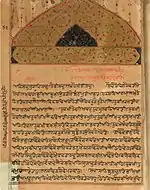Sarbloh Granth
The Sarbloh Granth (Punjabi: ਸਰਬਲੋਹ ਗ੍ਰੰਥ, sarabalōha grantha, literally 'Scripture of Wrought Iron'),[1] also called Manglacharan Puran or Sri Manglacharan Ji, is a voluminous scripture, composed of more than 6,500 poetic stanzas.[2] It is considered as an amalgamation of writings of Guru Gobind Singh and other poets.
| Part of a series on |
| Sikh scriptures |
|---|
 |
| Guru Granth Sahib |
|
| Dasam Granth |
| Sarbloh Granth |
| Varan Bhai Gurdas |
The Sarabloh Granth is a separate religious text from the Guru Granth Sahib and Dasam Granth, and no hymn or composition of this granth is used in daily Sikh liturgy or Amrit Sanchar. Khalsa Mahima is present in this granth.[3]
There is no complete commentary or exegesis of this granth available, and it is still under research.[4] The complete granth was first printed by Jathedar Santa Singh Nihang at Budha Dal Printing Press, Patiala.
Authorship
There is high controversy among various scholars on authorship of Granth. Following are some of points:
- According to Pundit Tara Singh, Sarabloh Granth was composed by Bhai Sukha Singh, a Granthi of Patna.[5] He put Khalsa Mahima in same granth to make people believe it to be composition of Guru Gobind Singh.
- According to Bhai Kahn Singh Nabha, Sarabloh Granth was not written by Guru Gobind Singh and Khalsa Mahima appeared in it is out of context to the main storyline.[6]
- According to Santa Singh Nihang, Sarabloh Granth was written by Guru Gobind Singh and was completed in Nanded.[4]
- Early Sikh historical resources, like Sri Gur Sobha, Parchi, Gurbilas Patishahi 10, etc. mention the Khalsa Mahima of Sarabloh Granth.
Content
Sarabloh Granth contains 5 chapters:
- Eulogy of Devi. Battle of Devi with Daitya Bhim Naad. Killing of Bhimnaad.
- Sati of wife of Bhimnad, Brij Naad(Brother of Bhim Naad) prepare to fight Devta.
- Narda-Brijnaad dialogue on agreement, Killing of 11 Minister of Brijnaad in battle
- Battle of Brij Naad and Devta. Amrit pva ke jagana. Win of Daitya and putting Indra behind prison. Conquering Indra Lok.
- Call Supreme for Help. Supreme manifests as Sarabloh Avtar. Fight after non agreement. Battle of Brij Naad and Sarabloh. Killing of Brij Naad.
In Guru Granth Sahib and Dasam Granth, There is no reference to Brijnaad and Bhimnaad. In Dasam Granth, Sarabloh is not used for any Avtar. The Sarbloh Granth was under protection and guard by the Nihang Singhs, before it was published.
See also
References
- Nabha, Kahn Singh. "ਸਰਬਲੋਹ". Gur Shabad Ratnakar Mahankosh (in Punjabi). Sudarshan Press.
ਸੰ. ਸਰ੍ਵਲੋਹ. ਵਿ- ਸਾਰਾ ਲੋਹੇ ਦਾ
- Mann, JaGurinder Singh nak (1 March 2007). El sijismo. Ediciones Akal. p. 76.
- Singh, Janak (22 July 2010). World Religions and the New Era of Science. Xlibris Corporation.
- Singh, Dayal. Sarabloh Granth Steek. Buddha Dal Panjvaan Takht Printing Press, Bagheechi Baba Bamba Singh Ji, Lower Mall Road, Patiala. p. Intro-ਠ.
- Nabha, Kahn Singh. "ਸਰਬਲੋਹ". Gur Shabad Ratnakar Mahankosh (in Punjabi). Sudarshan Press.
ਪੰਡਿਤ ਤਾਰਾ ਸਿੰਘ ਜੀ ਦੀ ਖੋਜ ਅਨੁਸਾਰ ਸਰਬਲੋਹ ਗ੍ਰੰਥ ਭਾਈ ਸੁੱਖਾ ਸਿੰਘ ਦੀ ਰਚਨਾ ਹੈ, ਜੋ ਪਟਨੇ ਸਾਹਿਬ ਦਾ ਗ੍ਰੰਥੀ ਸੀ. ਉਸ ਨੇ ਪ੍ਰਗਟ ਕੀਤਾ ਕਿ ਮੈਨੂੰ ਇਹ ਗ੍ਰੰਥ ਜਗੰਨਾਥ ਦੀ ਝਾੜੀ ਵਿੱਚ ਰਹਿਣ ਵਾਲੇ ਇੱਕ ਅਵਧੂਤ ਉਦਾਸੀ ਤੋਂ ਮਿਲਿਆ ਹੈ, ਜੋ ਕਲਗੀਧਰ ਦੀ ਰਚਨਾ ਹੈ
- Nabha, Kahn Singh. "ਸਰਬਲੋਹ". Gur Shabad Ratnakar Mahankosh (in Punjabi). Sudarshan Press.
ਅਸੀਂ ਭੀ ਸਰਬਲੋਹ ਨੂੰ ਦਸ਼ਮੇਸ਼ ਦੀ ਰਚਨਾ ਮੰਨਣ ਲਈ ਤਿਆਰ ਨਹੀਂ, ਕਿਉਂਕਿ ਇਸ ਵਿੱਚ ਰੂਪਦੀਪ ਭਾਸ ਪਿੰਗਲ ਦਾ ਜਿਕਰ ਆਇਆ ਹੈ. ਰੂਪਦੀਪ ਦੀ ਰਚਨਾ ਸੰਮਤ ੧੭੭੬ ਵਿੱਚ ਹੋਈ ਹੈ, ਅਤੇ ਕਲਗੀਧਰ ਸੰਮਤ ੧੭੬੫ ਵਿੱਚ ਜੋਤੀਜੋਤਿ ਸਮਾਏ ਹਨ, ਅਤੇ ਜੇ ਇਹ ਗ੍ਰੰਥ ਅਮ੍ਰਿਤ ਸੰਸਕਾਰ ਤੋਂ ਪਹਿਲਾ ਹੈ, ਤਦ ਖਾਲਸੇ ਦਾ ਪ੍ਰਸੰਗ ਅਤੇ ਗ੍ਰੰਥ ਪੰਥ ਨੂੰ ਗੁਰੁਤਾ ਦਾ ਜਿਕਰ ਕਿਸ ਤਰਾਂ ਆ ਸਕਦਾ ਹੈ? ਜੇ ਅਮ੍ਰਿਤਸੰਸਕਾਰ ਤੋਂ ਪਿੱਛੋਂ ਦੀ ਰਚਨਾ ਹੈ, ਤਦ ਦਾਸ ਗੋਬਿੰਦ, ਸ਼ਾਹ ਗੋਬਿੰਦ ਆਦਿਕ ਨਾਮ ਕਿਉਂ? ਸਰਬਲੋਹ ਵਿੱਚ ਬਿਨਾ ਹੀ ਪ੍ਰਕਰਣ ਖਾਲਸਾ- ਧਰਮ ਸੰਬੰਧੀ ਭੀ ਕਈ ਲੇਖ ਆਏ ਹਨ.